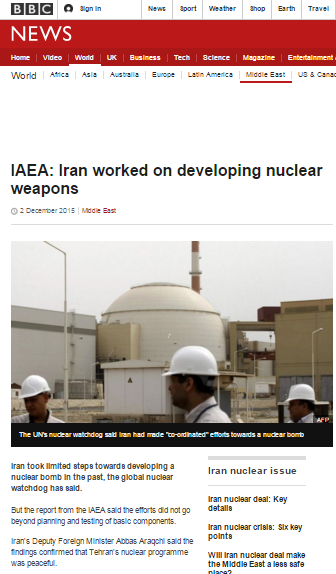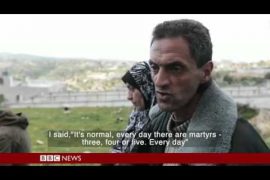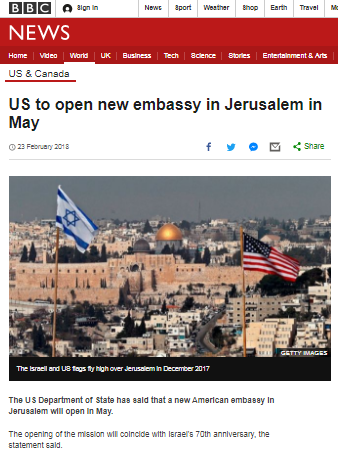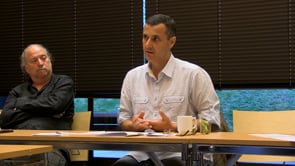December 2nd saw the appearance of an article titled “IAEA: Iran worked on developing nuclear weapons” on the BBC News website’s Middle East page. Readers of that report were informed that:
“Iran took limited steps towards developing a nuclear bomb in the past, the global nuclear watchdog has said.
But the report from the IAEA said the efforts did not go beyond planning and testing of basic components.
Iran’s Deputy Foreign Minister Abbas Araqchi said the findings confirmed that Tehran’s nuclear programme was peaceful.”
Not only was that obviously highly questionable statement from the former Iranian chief negotiator not challenged by the BBC but – like many of the corporation’s past reports on the topic of the Iranian nuclear programme – the article went on to emphasise that:
“Iran has long insisted its nuclear activities are peaceful…”
Reporting on the same statement, AP presented its audiences with a more critical and realistic view.
“Iran has consistently denied any interest in nuclear arms or past work on such weapons, and Iranian Deputy Foreign Minister Abbas Araqhchi told Iranian television that the International Atomic Energy Agency report “confirms the peaceful nature” Iran’s nuclear program.
But the report contested that view and came down on the side of U.S. allegations, saying the agency “assesses that a range of activities relevant to the development of a nuclear explosive device were conducted in Iran prior to the end of 2003 as a coordinated effort, and some activities took place” up to 2009.
At the same time, the report said any such work was restricted to “feasibility and scientific studies” that stopped short of the advanced development of such weapons.
No previous IAEA report has so clearly linked Iran’s past nuclear work to weapons development.”
The BBC did not provide a link to the IAEA report and so audiences were unable to study its content and implications further. In contrast to the BBC’s minimalistic – and even dismissive – presentation of the report’s content, the New York Times explained the issue to its readers in a decidedly more comprehensive manner.
“Iran was actively designing a nuclear weapon until 2009, more recently than the United States and other Western intelligence agencies have publicly acknowledged, according to a final report by the United Nations nuclear inspection agency.[…]
But while the International Atomic Energy Agency detailed a long list of experiments Iran had conducted that were “relevant to a nuclear explosive device,” it found no evidence that the effort succeeded in developing a complete blueprint for a bomb.
In part, that may have been because Iran refused to answer several essential questions, and appeared to have destroyed potential evidence in others. […]
Tehran gave no substantive answers to one quarter of the dozen specific questions or documents it was asked about, leaving open the question of how much progress it had made.
The report, titled “Final Assessment of Past and Present Outstanding Issues Regarding Iran’s Nuclear Program,” will not satisfy either critics of the nuclear deal or those seeking exoneration for Iran. Instead, it draws a picture of a nation that was actively exploring the technologies, testing and components that would be needed to produce a weapon someday. However, it does not come to a conclusion about how successful that effort was. […]
At Iran’s Parchin complex, where the agency thought there had been nuclear experimental work in 2000, “extensive activities undertaken by Iran” to alter the site “seriously undermined” the agency’s ability to come to conclusions about past activities, the report said.”
The Wall Street Journal noted:
“A key part of the agency’s investigation focused on a military base south of Tehran called Parchin, where Iran is suspected to have conducted tests related to a nuclear weapon. The agency maintains Tehran constructed a chamber at Parchin to safely contain the effect of tests involving the detonation of more than 150 pounds of high explosives.
Iran told the agency that the building was for storing chemicals and producing explosives, but a senior diplomat said those materials would have shown up in samples taken at Parchin this summer if that were the case. The report said they didn’t and concluded Iran’s explanation therefore didn’t fit the facts.
The agency said in its report that Tehran had aggressively sanitized the Parchin site in recent months.
“The agency assesses that the extensive activities undertaken by Iran since February 2012 at the particular location…undermined the agency’s ability to conduct effective verification,” the report said.”
Curiously, at no point in the BBC’s account of the story was it clarified that the Iranian activities documented by the IAEA constitute a breach of the Nuclear Nonproliferation Treaty (NPT).
BBC reporting on the issue of Iran’s nuclear programme and the JCPOA deal has long been uncritical and anodyne, generally failing to provide audiences with information which goes beyond the kind of US State Department talking points also seen in this report.
This particular article, however, reaches a new nadir in superficiality – as is glaringly obvious when it is compared to the reporting of other media organisations which are not legally obliged to enhance their audience’s “awareness and understanding of international issues” and do not describe themselves as “the standard-setter for international journalism”.




